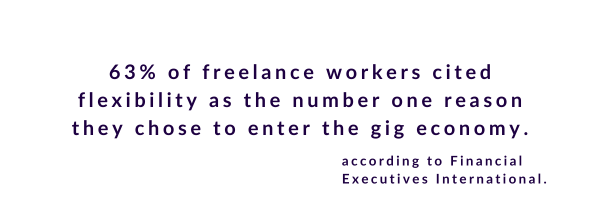5 key insights about the gig economy in 2024. Gig work now makes up a significant portion or the American economy. Here are 4 key takeaways and trends from the gig economy in 2024.
The term “gig economy” refers to the collection of workers who receive income from short-term contracts, side hustles and freelancing. According to McKinsey’s American Opportunity Survey, 36% of respondents identified as independent workers, representing nearly 60 million Americans.
Gig workers now comprise a significant and ever-growing portion of the U.S. workforce, with many participating in the gig economy in addition to other, full-time employment. These workers offer unique perspectives on the nature of part-time work and are redefining what’s possible when it comes to building a career.
Here are 5 key takeaways from the gig economy in 2024.

1. The gig economy is dominated by immigrants and Gen Z workers
The benefits of working as a freelancer are attractive to a younger generation. Those in Gen Z tend to be more tech-savvy, utilizing the internet as a marketing tool to promote their talents and offerings, leading to an influx of younger workers.
Around 70% of Gen Z respondents consider freelance work a viable full-time career option, according to survey data from Fiverr. Another 41% of Gen Z respondents felt freelancing was a good way to increase their income amid economic uncertainty.
The gig economy is also highly attractive to first-generation immigrants. According to the same McKinsey survey data, nearly half of all surveyed immigrants participate in the gig economy. This type of work may be particularly attractive to immigrants as it often offers a lower barrier to entry. It also can be a helpful stepping stone to pursuing full-time employment.
2. Flexibility is king
Many gig economy employers allow employees to set their own hours, attracting employees away from more traditional jobs with the promise of increased flexibility. According to Financial Executives International, 63% of freelance workers cited flexibility as the number one reason they chose to enter the gig economy.
This flexibility is important to employees in more than just their schedules. One of the bigger draws of gig work is getting paid quickly and outside of a typical pay period structure. According to a survey by HRO Today, Almost 4 in 10 gig workers get paid immediately when their job is finished, as opposed to a more structured payout.
3. The majority of gig economy workers are not attempting to replace a full-time income
The point of adding on freelance work for many gig employees was not to replace full-time employment. Rather, it is to supplement their income to help pay for household bills and other expenses. According to that same survey by HRO Today, as many as 1 in 4 workers either do their gig work simply because they like it, or because they want to be more intentional with their spare time.
The growth in the gig economy is paired with the increase of interest in “side hustles”, a popular strategy to combat inflation and address rising costs. Gig work may help alleviate concern for employees to have a steady stream of income while within a fast-changing and rapidly evolving economy.
4. Many workers see their gigs not as the final step, but as a gateway to opportunity
Gig economy participants tend to be more optimistic about their future job prospects than full-time employees. According to the American Opportunity Survey by McKinsey, over 33% of gig workers say that they expect to have more economic opportunities in a year, as opposed to 20% of full-time employees.
This optimism is likely well-placed as the demand for gig positions only continues to grow across the U.S. A report by the World Bank found that the demand for gig work increased 41% between 2016 and 2023. If you are looking to start a financial wellness initiative in your business, try Best Money Moves.
5. Gig economy workers increasingly want better benefits
Due to the competitive nature of the gig economy for both employers and contractors, the availability of benefits can be an important factor for people choosing where to work. According to Financial Executives International, only 8% of female gig workers hold a pension plan. Pre-pandemic benefits such as health insurance and sick leave were considered as a trade-off to flexibility in permanent employment.
However, since 2020, there has been an increase in flexibility allowed by those positions especially seen with the increase of remote work. Companies that employ these freelancers are always trying to gain an advantage in hiring, and providing benefits offers a significant one.
To learn more about Best Money Moves Financial Wellness Platform, let’s schedule a call. Contact us and we’ll reach out to you soon.

